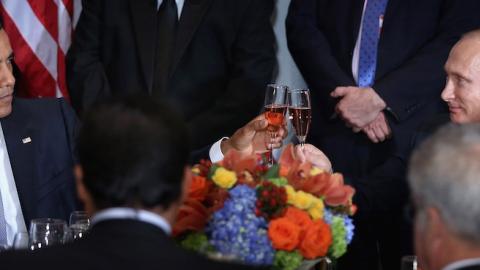On Thursday, the White House announced that President Obama would meet Russian President Vladimir Putin on the sidelines of the United Nations General Assembly. For the past year, President Obama shunned the Russian strongman in an attempt to isolate him over the Russian occupation of Ukraine. What caused the president to reverse course and agree to a tête-à-tête? Obama’s decision was taken in the shadow of a significant Russian military buildup in support of the regime of Bashar Assad in Syria. By deploying Russian troops, Putin appears to have gotten what he coveted—an opening out of isolation.
Six years into the Obama presidency, the American concession in granting the Obama-Putin meeting is the latest in a long list of Kremlin victories. But the lopsided scorecard of U.S.-Russian relations during the Obama years is no coincidence. It can be explained by a fundamental flaw in President Obama’s worldview, one which Putin has repeatedly exploited: the idea that engaging rather than confronting hostile regimes incentivizes them to improve their behavior.
This mindset predates Obama’s presidency. During his first presidential campaign, Obama proposed presidential meetings with even America’s most implacable enemies, as if American foot-dragging was a principal source of global problems. It would be “ridiculous” and “a disgrace,” then-Senator Obama argued, for the United States to refuse to meet our enemies on their terms. With a few carefully placed concessions, so his thinking went, an Obama administration would catalyze international cooperation and transform relationships by reassuring adversaries of our benevolence. The hard realities of power politics, including the temptation to use force in places like Syria, would fade as the mesmerizing attraction of engagement took hold. An era of American paranoia would be replaced by a new period of global cooperation.
Tests of this theory with Russia have repeatedly produced less than encouraging results, however. Just a few months into his first term, in April 2009 during a visit to Prague, President Obama argued that the U.S. has “a moral responsibility to act” for the elimination of nuclear weapons because it is “the only nuclear power to have used a nuclear weapon.” Shortly thereafter, the administration negotiated an arms control agreement with Russia that required only American reductions in nuclear warheads and strategic launchers. Today, Russia issues nuclear threats and continues to violate the Intermediate-Range Nuclear Forces Treaty.
Similarly, in September 2009, the Obama administration canceled missile defense installations in Eastern Europe as part of its much heralded reset with the Kremlin. Less than a year later, in May 2010, the president certified that the Russian invasion of Georgia “need no longer be considered an obstacle” to nuclear cooperation with Moscow. Four years after that? Russian troops invaded Ukraine and Moscow annexed Crimea. (Russian troops remain deployed across large parts of Georgia, creeping forward by the day.)
In each instance, Obama has wagered the prestige, resources, and moral authority of the U.S. government on the hope that he can personally bend the arc of history. Time after time, Putin has preyed on Obama’s goodwill, and cleaned his clock. Indeed, beneath all the resets and rhetoric is a fundamental truth: what matter is not just the intentions of the president; the calculations of our competitors and enemies matter, too—and must be taken seriously.
The implications are especially bleak for the Middle East. Obama’s commitment to ending the Iraq war helped propel him—perhaps more than any other issue—to the presidency. And his recoil from the assertion of American power and influence has only persisted. Last year, the president dismissed the need for a residual force in Iraq as “bogus” and “wrong” and declared himself undisturbed by the situation in Iraq’s neighbor to the west: “I am not haunted by my decision not to engage in another Middle Eastern war [in Syria].” Instead, he has channeled his energies toward negotiating the Iran nuclear accord, which facilitates Iran’s breakout from international sanctions in the hopes of moderating Iranian behavior.
Today, U.S. influence in the Muslim world is at its nadir, not least because the American commitment to the moderate opposition in Syria is the laughingstock of the region, having produced only a handful of fighters. In London last week, Secretary of State John Kerry continued the charade, assuring the world that “we’re not being doctrinaire” on the timing of Assad’s departure—just the opposite, he promised, “we’re open” to “whatever.” By contrast, in conjunction with his Iranian partners, Putin has moved with alacrity and speed to deploy his forces, fill the vacuum, and shore up Assad—in Latakia, the ancestral homeland of the Assad regime, the latest reports are of up to 2,000 Russian troops on the scene, equipped with advanced fighter jets and anti-aircraft systems.
This sets up a major showdown in New York on Monday. In Syria, Putin is altering the facts on the ground. Meanwhile, President Obama envisions a grand diplomatic settlement that results in Assad’s departure.
If history is any guide, Obama is about to have his clock cleaned, yet again.
















